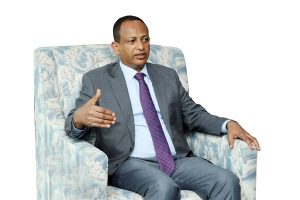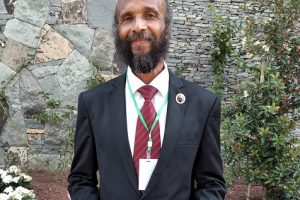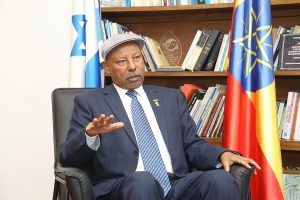
BY GIRMACHEW GASHAW
Today’s guest of The Ethiopian Herald, Dr. Janet Byaruhanga, is a medical doctor and public health expert that obtained her postgraduate diploma in public health research from the University of Edinburgh and has more than 13 years of experience in international development with a special focus on human and social sectors.
Served as a health policy officer at the African Union Commission since 2007 where she provided technical leadership and oversight in the development and delivery of key strategic continental policy frameworks, programs, and initiatives geared towards strengthening the continent’s healthcare delivery system, food security, and nutrition, and promoting the social well-being and rights of women and children.
Dr. Byaruhanga since 1st September 2017 joined the African Union Development Agency- NEPAD as a Senior Programme Officer-Health. She is in charge of coordinating and facilitating the development and implementation of policies on health and medical products and ensuring their alignment with industrial development; trade; science, technology, and innovation policies in the advancement of the African Union’s African Health Strategy and the Pharmaceutical Manufacturing Plan for Africa (PMPA).
In connection with the 60’s anniversary of the African Union, we had a brief stay with Dr. Byaruhanga with regard to the ongoing AU’s reform, and its value in terms of realizing the Agenda 2063 and others. Have a nice read.
How do you understand African Union Reform mean for you?
African Union Reform, just from the word reform, I would imagine that things were going a certain way and now there is a need to reform. In short, the original form is not working. That is the very reason why you need reform. And reforms do happen for every organization that has existed for over the years that it has existed. Remember, it is a very old organization. So it is normal to have reforms or restructuring of organizations. And so to improve the efficiency at which activities are being done, the effectiveness of our programs, and how we impact our member states with our work.
What is the significance of reforming the African Union?
The significance is if we see for example the number of organs and agencies and institutions some specialize in some continent-wide organizations and institutions that are organs of the AU that have been established.
Of course, they are established with a particular mandate, a specific role to play. But then as time goes on, we realize that there is a tendency to duplicate. And to be effective and use the minimum resources that we have efficiently, we need to rationalize how we are creating new institutions, how the institutions are working, and the mandates of these institutions so that we streamline and we are more effective and are using our resources more meaningfully by giving some clarity to specific roles and responsibilities.
So, when an organization is set up for a particular purpose, they should make sure that they are within the scope of what they were established for. And because there was a realization that there is a lot of duplication at the member state level with the regional economic communities, with the African Union, with the different organs of the African Union. So member states who are our ultimate client, who are our ultimate beneficiaries of these programs or these organizations’ work, then tend to be overwhelmed by the fragmented manner in which we approach them to implement certain programs. So, it has an impact on how we use our resources, how we use our limited human resources and skills to be able to deploy impactful programs.
So I think that is the significance of why it is going to bring a bit of sanity in terms of structures and programs and resource mobilization and complementarily. Building that requires a proper structure that is effective. So I think that is why we have a reformed structure, and that is why we have the debate going on about how effectively we can implement this new idea that President Kagame, who was chairing the high-level committee that was on restructuring, was doing. So whatever proposals have come out have to now be implemented, and we need to see how effective they then become. It is more like a pilot. Let’s just try out the proposed reforms and see whether we’re going to make value for money.
The member states are struggling economically because of COVID and some other disasters and wars and instability in some cases, which makes the economies quite weak. So now if you again strain them by tapping their resources to support the AU organs, the multiplicity of initiatives and programs and organs, it all makes the already weak economies even weaker. So to utilize member states; contributions effectively, this restructuring is a welcome thing for both the member states and also the agencies and organs themselves.
When the African Union was established, it had its target. Do you think that the AU has hit the target set to achieve? If so or not, what are the challenges?
I am sure I was a very young girl when the AU started. In 2013, it made 50 years. And I can assure you before, when it first started with a few member states that came together, including your president, I think at that time, the idea was to make sure that countries that had not yet got independence, do get their independence from the colonial masters.
So the first target was mainly securing our sovereignty as nations. It was quite political, so there was galvanizing each other energies and support to get every member state of the AU independent. That target came, and most countries got their independence. We had to move on and started entering into the arena of development. After you have secured your independence, what next? You need to maintain it in terms of peace and security and stability. So the institution was still very much required because this is a platform for solidarity, to sustain each other in a peaceful and prosperous continent. We cannot obtain the prosperity that the AU vision is about without working on our economies and improving them. So that is where you started these other plans of Lagos and all of that to ensure economic integration. So when you hear today of the African continental free trade area, it did not start two years ago or three years ago.
This debate started way back during the OAU days when the Lagos plan of action, all these economic integration conversations began in the 90s. In those times, the idea was to say, since the colonial masters had divided us into small independent economies that cannot prosper on their own, the need for integrating these economies would bring us much better results in terms of the union. We needed to be more powerful and the only way we could be more powerful is not to remain as single sovereign little economies that the colonial masters had just left us in, but rather to work together to build and integrate our economies. And that when the regional economic communities started coming up and all these debates and negotiations for an integrated continent and economy started to happen.
And at the regional level, they have had significant progress. When you look at some of the economic communities having a common market, having a common passport, having free movement of people and goods and services, and reduced tariffs on some of the goods, it already shows you that economic integration leads us, Africa, to a better standing as economies rather than remaining as individual economies. And we make better negotiations with other entities in the world because, again, our vision as AU is for the African Union to be a significant player in global discourse.
So when people are discussing development, people are discussing energy, discussing land, water, climate change, those global platforms, Africa should have a voice as Africa, not as individual little economies. So that integration process was started not as the primary goal at the beginning of the establishment of OAU, but then as we started getting one thing after the other, then we started to broaden the scope of the AU. Personally, coming to the African Union as a health practitioner in my public health field, I did not envisage African Union even having a department that deals with these issues.
I thought that as human capital is a fundamental and critical ingredient of development, you cannot build human capital when the humans are not healthy, they are not well nourished, they have no skills, and there is no balance in terms of the various segments of the population, including the youth and the women, the young and the old, and all the segments of the population are important. I came into this union to support those types of structures, which means that I found the AU beyond peace and security, into the development world, and the social and other economic areas of scope of work. So yes, our targets must go beyond just peace and security and go into development.
What do state governments do to strengthen the AU in general and the ongoing reform in particular?
All the 55 member states of the AU are in support of the reforms. They, for instance, are supporting the activities financially and so on. What these 54 countries should do to strengthen the African Union and the reform as well? Since they are our ultimate beneficiaries, as an institution we are established to support the member states, right?
To achieve their goals, developmental goals, especially from where I sit at the AU DNA part, we are very much concerned about the targets of Agenda 2063. Those aspirations and goals that we have put forward for the next how many years to achieve by 2063, and dividing them into 10-year action plans, enables us to measure the progress that we are making. What are we asking member states to do? We are asking member states to invest smartly in their development. And we are giving them tools, we are giving them the capacity, which we source from even within the continent and redistribute it across the various member states, looking at how the different levels at which they are. Because remember, we are a very diverse continent.
Every country is at a different level economically, socially, and culturally, sometimes even in terms of peace and security. Some countries are still struggling, so we need to target our interventions according to the problems each country is facing. So our part to member states usually is very much linked with what the situation is like and their development vision. Every country has got a national development plan and it has its targets. How we come in is to say, are you able to achieve this? What additional support is required for you to be able to achieve your national development goals, which must be aligned with the development goals at the continental level that we have proposed, which we think is a good enough framework to allow for a holistic approach to development, holistic approach to peace, holistic approach to different areas of struggles that our continent goes through, our different member states go through, from a human, social, development and other aspects of society.
If you want to add any more points, please take a chance.
I just wish you good dissemination of the good messages that the African Union wants to send out. And encourage your readers to seek clarity where they need it and to seek it from the right people. So, we are in it together as Africans. Sometimes we do destroy each other. I don’t know whether it is to sell news or to be just negative, but we have to pay attention to the narrative we give to ourselves because we are all Africans, we all want our continent to grow, we all want our economies to be sustainable, and we want to leave a legacy for our posterity. So, for me, that is the big message I would like to disseminate amongst other media people.
Thank you very much for your time and valuable message.
Don’t mention it.
THE ETHIOPIAN HERALD SATURDAY 20 MAY 2023





